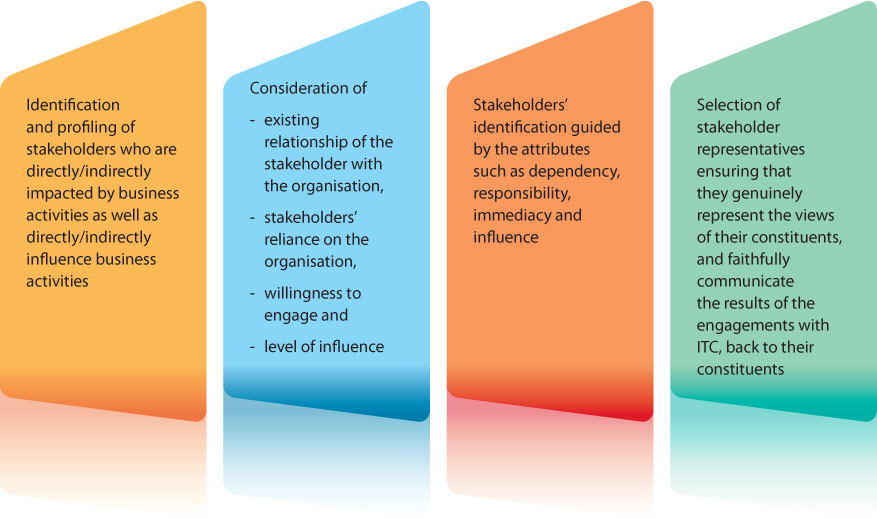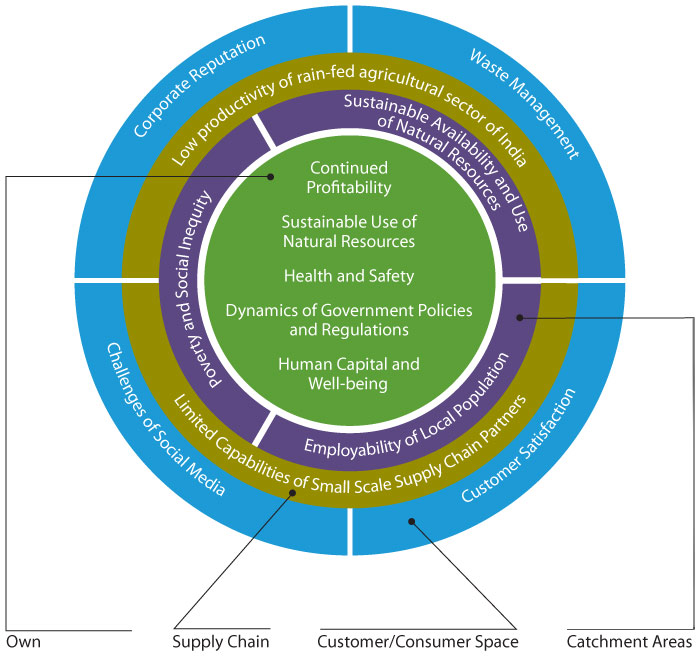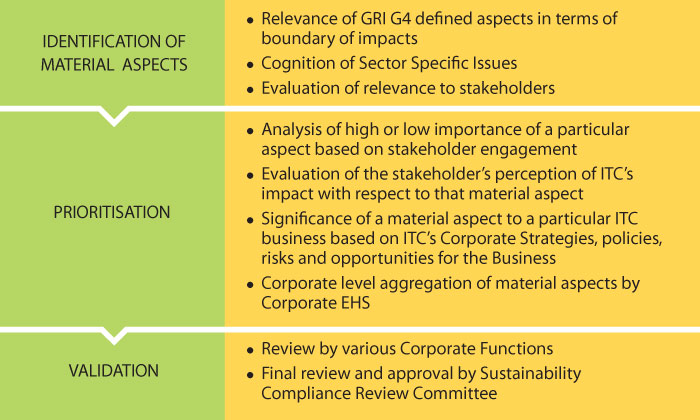-
Category: Environment
ITC has a structured approach to address stakeholders' concerns, in line with the Company's policy on stakeholder engagement. The approach draws upon the long term stable relationships built with key stakeholders such as shareholders, farmers, customers, suppliers, employees, local communities, regulatory bodies and the media. Recognising that stakeholder engagement is an integral part of enriching partnerships, ITC has institutionalised these existing relationships through appropriate processes. Targeted consultations are being conducted on a regular basis, with due weightage given to each stakeholder's nature of engagement with the organisation. The stakeholder engagement processes focus on:

Details of each of the above mentioned steps are elaborated below.

Highlighted below are the consultation mechanisms with the key stakeholders, together with key concerns, requirements and expectations identified through them.
| Stakeholder | Consultation Mechanism | Key Issues |
|---|---|---|
| Providers of Financial Capital |
|
|
| Government and Regulatory Authorities |
|
|
| Customers |
|
|
| Employees |
|
|
| Farmers |
|
|
| Supply Chain Partners |
|
|
| Local Communities |
|
|
| Media |
|
|
| Civil Society |
|
|
The sensitivity of an issue to a stakeholder and to ITC, in terms of high/ low importance forms the basis of the materiality analysis. Please refer to the Materiality Analysis section for further details.
As a diversified enterprise, ITC has always upheld a system-based approach to business risk management. The Corporate Risk Management Cell works with the Businesses to establish and monitor the specific profiles including strategic, operational, environmental and social risks. The process includes the prioritisation of risks, selection of appropriate mitigation strategies and periodic reviews of the progress on the management of risks. The annual planning exercise requires all Businesses to clearly identify their top risks and set out a mitigation plan with agreed timelines and accountability. The senior management of the Company also periodically reviews the risk management framework to keep it contemporary and relevant so as to effectively address the emerging challenges in a dynamic business environment.
Based on the ongoing risk assessments at Businesses level and aggregated at the organisation level, ITC has classified its sustainability challenges into two broad categories - those that are influenced by global events, and challenges that are unique to India.
According the World Economic Forum Report on Global Risks 2015, short term risks that endanger the world today arise as a direct outcome of human action, including interstate conflicts, collapse of states, governance deficits and large-scale terrorist attacks. On the other hand, the list for long term global risks is dominated by those related to physical and environmental issues that have been less prominent in recent headlines, such as climate change and food & water security. Although the importance of these slow-burning issues have been recognised by the world at large, little progress has been made to address them in light of their detrimental and far-reaching consequences for the current and future generations. The expected impact of climate change on the ability to grow food and access water could further exacerbate population migrations, thereby threatening the socio-economic stability of receiving countries.
Another growing concern is unemployment and underemployment further contributing to social and rising socio-economic inequality. This is reflected in the fact that among the members of the Organisation for Economic Co-operation and Development (OECD), the average income of the richest 10% has now grown to about nine times that of the poorest 10%.
The anticipated and real impacts for the above issues amongst developed and developing countries are however vastly different, both in scale and scope. These differences are multi-layered and multi-faceted given the dimensions of the challenges and the socio-economic environment prevailing in different countries. Given this context, countries like India while cognising for the larger global challenges, will have to shape their own sustainability agenda with focus on specific issues that have an immediate and direct impact on the Indian society at large.
It becomes essential to understand in this context that while India mirrors many of the global challenges, issues like poverty, social inequities, unemployment, environmental degradation, water and food crises assume even more acute and multi-dimensional characteristics in India. Land pressure for instance, assumes greater significance in India which is home to 17% of the world's population, with only 2.4% of the world's land share.
Agriculture in India engages around 50 per cent of the country's workforce and supports the livelihoods of 75 per cent of the population living below the poverty line. Ironically however, agriculture today accounts for just about 14 per cent of GDP and therefore, the average farmer's per capita income is less than one-fifth of the rest of the country's average. Such low incomes are a result of a deteriorating natural resource base, disconnected value chains, fragmented and small-size landholdings, weak infrastructure, inadequate knowledge and multiple intermediaries. In addition, around 55% of India's total sown area meets its requirements from rainwater alone. This assumes importance in the face of climate change related challenges of erratic rainfall leading to drought and floods. A majority of the farmers are hence trapped in a vicious cycle of low productivity and low investments. Therefore there is a need to address these challenges by means of ensuring farming population's sustainable access to water, knowledge and other necessary resources, whilst simultaneously arranging for diversifying the income base for India's workforce aligned with Government of India's "Make in India" campaign.
The other risks that India faces are inadequate infrastructure and the failure of urban planning in the face of rapid urbanisation. As per a World Bank Study "Power for All: ELECTRICITY ACCESS CHALLENGE IN INDIA" published in November 2014, around 311 million people in India still remain without access to electricity. Of these, more than 100 million currently are beyond the reach of the grid and can be reached only by using decentralised household or village systems. On the other hand, rapid urbanisation, increasing population, higher consumption levels and inadequate infrastructure are putting a severe strain on the ecology. A large amount of waste being generated today ends up in landfills, leading to serious concerns of public health and sanitation risks as well as large scale environmental degradation. Negative impacts of urbanisation are also manifest in the pollution of almost all Indian rivers that have been absorbing domestic and industrial sewage and agricultural wastes over the last few decades. Apart from posing a serious health problem to millions of people that continue to depend on polluted water from rivers, this also endangers the biodiversity dependant on it. It is therefore the need of the hour for the country to invest in basic infrastructure. This will further require enormous resources that can only be generated with a larger focus on livelihood creation and widening of the tax base.
ITC's operations and markets are India centric and the Company's world-class Indian brands ensure that larger value is created, captured and retained in the country for national development and growth. Therefore the organisation's sustainability is closely driven by the country's advantages and vulnerabilities. In line with the risks and opportunities that may impact India's economic, social and environmental sustainability, ITC has mapped the key challenges, risks and opportunities likely to impact its own long-term prospects and those of its stakeholders.

| Challenges | Risks and Opportunities |
|---|---|
| Own Operations | |
|
Risks
Opportunities
|
|
Risks
Opportunities
|
|
Risks
Opportunities
|
|
Risks
Opportunities
|
|
Risks
Opportunities
|
| Catchment Areas | |
|
Risks
Opportunities
|
|
Risks
Opportunities
|
|
Risks
Opportunities
|
| Supply Chain | |
|
Risks
Opportunities
|
|
Risks
Opportunities
|
| Customer/ Consumer Space | |
|
Risks
Opportunities
|
|
Risks
Opportunities
|
|
Risks
Opportunities
|
ITC's Materiality matrix enabled the design of the content of this Report so as to provide a reasonable and balanced picture of the organisation's Triple Bottom Line impacts and its performance. ITC's materiality analysis is based upon the following three pronged approach.


|
Procurement from Local Suppliers Employee Engagement |
Economic Performance Local Community Development Statutory Compliance Sustainable Livelihoods Employee/Customer Health and Safety Sustainable Forest Management Employment Product Packaging |
|
Anti-corruption Human Rights Transportation Public Policy Advocacy Product Labelling Customer Privacy |
Sustainable Supply Chain Learning and Development Natural Resources Usage Efficiency Marketing Communication Climate Change |
|
 |
||
| Sl. No. | Material Aspects | Details Available in Sections |
|---|---|---|
| 1 | Economic Performance | Economic Performance |
| 2 | Sustainable Livelihoods |
Economic Performance Social Investments - Mission Sunehra Kal |
| 3 | Procurement from Local Suppliers | Economic Performance |
| 4 | Climate Change |
Energy Air Emissions |
| 5 | Natural Resources Usage Efficiency |
Energy Water Management Recycling and Waste Management Raw Materials |
| 6 | Product Packaging |
Product Responsibility Recycling and Waste Management |
| 7 | Transportation |
Energy Air Emissions |
| 8 | Sustainable Forest Management |
Raw Materials Biodiversity |
| 9 | Sustainable Supply Chain | Supply Chain |
| 10 | Statutory Compliance | Product Responsibility |
| 11 | Employment | Labour Practices & Decent Work and Human Rights |
| 12 | Learning and Development | Labour Practices & Decent Work and Human Rights |
| 13 | Employee Engagement | Labour Practices & Decent Work and Human Rights |
| 14 | Human Rights | Labour Practices & Decent Work and Human Rights |
| 15 | Local Community Development |
Economic Performance Social Investments - Mission Sunehra Kal |
| 16 | Social Infrastructure |
Economic Performance Social Investments - Mission Sunehra Kal |
| 17 | Anti-corruption | Governance Structure |
| 18 | Public Policy Advocacy | Responsible Advocacy |
| 19 | Employee/ Customer Health and Safety |
Occupational Health and Safety Product Responsibility |
| 20 | Product Labelling | Product Responsibility |
| 21 | Marketing Communication | Product Responsibility |
| 22 | Customer Privacy | Product Responsibility |


